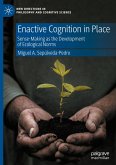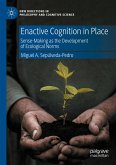The book is the first formulation of a meta-philosophical scheme rooted in the embodied cognition paradigm. The latter views subjects capable of cognition and experience as living, embodied creatures coupled with their environments. On the other hand, the emergence of experimental philosophy has given rise to a new context in which philosophers have begun to search for a more thorough definition of philosophical competence. The time is ripe for these two trends to join their efforts. Therefore, the book discusses what it means for a human being thought of as a living subject to pursue philosophy. In this context, in contrast to the existing literature, philosophical competence must not be conflated with competence in philosophy. The former is a skill or attitude. The book refers to this peculiar attitude as the recognition of one's epistemic position.
Bitte wählen Sie Ihr Anliegen aus.
Rechnungen
Retourenschein anfordern
Bestellstatus
Storno








